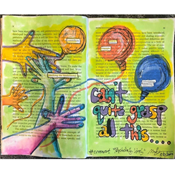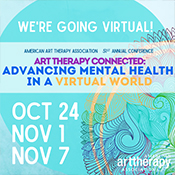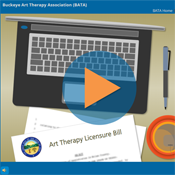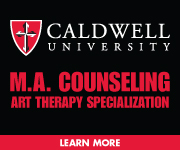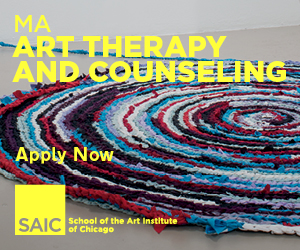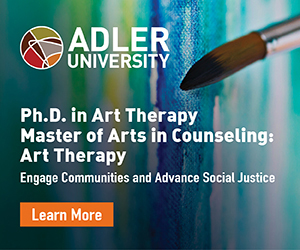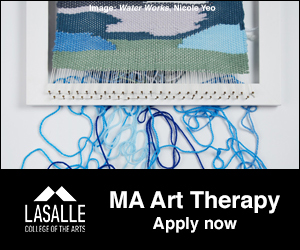 |
|||||||||||||||||||||||||
| Archive | Subscribe | Advertise | arttherapy.org | |||||||||||||||||||||||||
AATA News Art therapists, as mental health professionals, are frontline “essential workers” during the Coronavirus pandemic, according to the American Art Therapy Association’s online Coronavirus pandemic survey. Half (53.1%) of art therapists reported that they are continuing to go to work in person. The survey also found that in order to better respond to the unfolding mental health crisis during social distancing guidances, art therapists have transitioned to teletherapy either partially or entirely. It is also clear from the survey results that our nation is in the middle of a mental health crisis. Overall, access to mental health care has declined as a result of the Coronavirus pandemic, according to the art therapists that took this survey.
Susan Boxer Kappel, MA, ATR-BC, LCAT, CGP, Conference Chair We are excited to announce that registration for our virtual conference, Art Therapy Connected: Advancing Mental Health in a Virtual World is now open! The conference is an exceptional education and networking opportunity that provides attendees with flexibility and a library of up to 57 hours of on-demand learning! We invite you to join us! The conference will be held over three days, on Saturday, October 24, Sunday, November 1 and Saturday, November 7. The virtual program will feature leading art therapists who will share information to expand your knowledge, reinvigorate your career and inspire you during these unprecedented times. You will be able to learn in the comfort and safety of your home. If you are not able to attend presentations in real time, you can still access the sessions via the on-demand library. (Plus you will save on travel expenses!)
Ethics Committee Our clients – and in particular Black, Indigenous and People of Color – will likely experience myriad reactions and emotions to racially motivated injustices. It is crucial to acknowledge that these responses stem from historic and systemic race-based traumatic stress, and we must stand beside our clients to support them with authenticity, transparency and zero tolerance for racist attitudes and behavior. The outrage experienced by our clients is certainly valid and can be an agent of transformation. The American Art Therapy Association Ethics Committee provides this series of “best practice” papers as non-binding guidelines to help art therapists interpret and apply the Ethical Principles for Art Therapists. Find the full series on the Ethics page of AATA's website.
Ashley Skelly, ATR, LPCC-S As an art therapist or art therapy supporter, you are often asked to take action to contact state government legislators/leaders. Politics can be confusing to navigate, and the prospect of contacting senators/representatives may seem intimidating. However, legislators want to hear about the issues and changes needed from the people they represent – YOU! Art Therapy Legislation 101 (created by myself and Skelly Learning Studio LLC) was designed to bring Ohio art therapists simple information to assist in understanding the legislative process and the steps you can take to advocate for art therapy licensure – in only 20 minutes! While I developed this module specifically for the state political system of Ohio, most of the concepts apply for art therapy advocates in every state.
AATA News The 2020 election season is here! Online voting for the Annual Election commenced on August 10. All voting members received a notice with voting instructions via email. Find more information about elections and this year’s ballot, including the 2020 Candidate Slate, on MyAATA. All American Art Therapy Association members with a professional membership (New Professional, Professional, Credentialed Professional, Retired Professional) are eligible to vote in the AATA’s annual elections. Please contact info@arttherapy.org with any questions.
Rachel Albert, MS, MA, ATR Since I have a school-based position, my work with students pretty much stopped in March 2020. A handful of my students remained engaged in the online format and we continued to make art together, but most remained offline. Since I’m changing to an elementary school this year, I have no idea how that will go. High schoolers knew how to navigate the online platforms–I’m not sure how it will work with the little ones. We’ll see! The Conference Committee recognizes Rachel Albert, ATR, whose artwork was selected for the 2020 Annual Conference Logo for the Washington, DC in-person conference.
Diversity in Action "Margaret Carlock-Russo, president of the American Art Therapy Association (AATA), has just wrapped up a Friday-afternoon Zoom meeting to discuss how best to make resources available to the organization's members, many of whom are working on the front lines of the coronavirus pandemic. Jimmy Bulosan has been an art therapist for 16 years, and as a manager of expressive therapy on an inpatient behavioral unit in a small community hospital on Chicago's west side, he has seen patients who are already coping with poverty, continuity of care and other issues on top of the pandemic. A majority are people of color, a population disproportionately affected by the virus. He thinks art therapists in essential worker positions are helping enhancing treatment teams spread thin by COVID-19."
WUSA9 VIDEO: Niamca Cooper, 15, was a Project Create participant and is now interning with the program. “We combine art therapy with arts education, and just a really positive healthy environment for children and youth and families to come together in a safe environment, create art and work towards healing," Christie Walser, the Executive Director of Project Create, told WUSA9.
Huffington Post Canadians are sharing how they've processed pain from war, grief and abuse. Studies show that Black, Indigenous and People of Colour (BIPOC), especially Black and Indigenous people, are likely to report more stressful events that stem from racism experienced first-hand, witnessing violence happening to others or trauma passed down from previous generations, such as the residential school system’s devastating impact in Canada. Even after these experiences are over, growing research indicates that traumatized parents can pass down “epigenetic changes” to their children.
Mansfield News Journal An exhibition in the Foundation Gallery of the Mansfield Art Center is honoring people with cancer. Each work of art is the face of a cancer patient created with radiation masks and unused chemotherapy bags. Under the guidance of art therapist Dawn Freeman, the masks are created into art. Each piece tells a unique story that describes the feelings that went into the mask.
Central Track Murals cover the boarded windows of closed businesses in Deep Ellum. A boarded door on Main Street features a mural of a green and yellow tree trunk with leafless branches, reaching out to the words “Say Their Names.” Several names of Black people whose lives have been cut short by police violence are painted along the trunk and bottom of the board.
4 News Now VIDEO: COVID-19 has changed many things, but Superheroes 4 Kids week is still taking place to meet the needs of the community. “Kids process what they go through with play and creativity,” said Ann Walker with the art therapy program. “It may look like they’re just coloring, painting, playing music. But, they’re really working through their fear, their anxiety, their depression, their anger – all of the different feelings that go along with being hospitalized.”
Detroit Free Press Myron Wood, of Wixom, was among around 20 formerly incarcerated people seeking healing at a “summer camp” designed to address the trauma of being imprisoned as youths. Most in this group have spent decades behind bars and are adjusting to freedom for the first time as adults.
WMRA In the final installment of the Mental Health Matters series, WMRA dives into some of the arts-based therapies in the Shenandoah Valley, speaking to practitioners who use music, visual art and other methods to help people deal with grief, depression and anxiety.
|
|||||||||||||||||||||||||
|
The AATA's Art Therapy Today includes a digest of the most important news selected for the AATA from thousands of sources. Guest articles may be submitted to info@arttherapy.org. Publication of any guest article is at the sole discretion of the AATA. The opinions expressed and/or contents of guest articles, advertisements, and external links included in any AATA publication do not represent the positions or policies of the AATA. The AATA makes no warrenty or representation concerning the accuracy of such content. |
|||||||||||||||||||||||||
